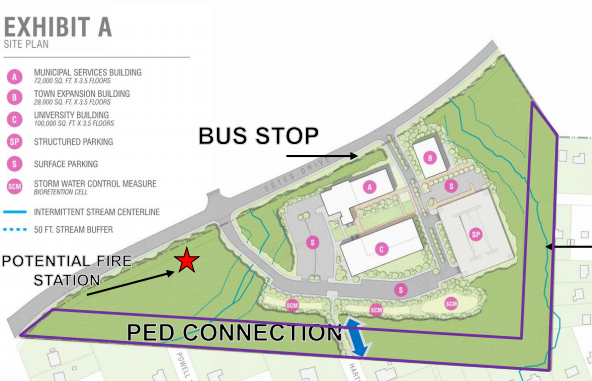The Chapel Hill Town Council voted last Wednesday to authorize town staff to proceed with a joint development agreement between the town and UNC for the future home of the town’s Municipal Services Center on university-owned property.
The agreement is to govern and regulate the development of the site on Estes Drive near the Elkin Hills neighborhood that the town plans to lease, according to the town’s Planning and Development Services senior planner Aaron Frank.
“The first phase would be the Municipal Services Center, which is about a 72,000 square-foot building, and a total of 200,000 square feet of built area would be permitted on the site, half of which may be occupied by the town,” said Frank.
Though the first and only phase currently on the timeline of development is the town’s Municipal Services Center, plans include two more buildings on the site – a second town building and a university building – to be built in future phases.
Frank said stormwater management for the entire site will be constructed with the first phase of development with the build-out potential for other future buildings.
“We’ve worked with staff, and we’ve worked with neighbors to identify a project scope of where staff could evaluate stormwater conditions. So we would be looking at pre-construction conditions of stormwater and be monitoring that. As we progress and determine the scope of the project, we’ll report back to council so we can identify exactly what the program will be,” Frank said.
According to Frank, future key components of the site include a 100-foot buffer on the east and south boundaries adjacent to the residential neighborhood, preservation of 50 percent of the site, two police service access entrances, a 615 spot parking deck, required native plantings with help from the North Carolina Botanical Garden and an unpaved walking and bike trail.
Frank said residents of Elkin Hills submitted the guiding principals for development on the site.
“We’ve worked with them to inform site decisions, both in the text of the development agreement as well in the design of the plan itself. It’s really played an active role in how this site is programmed,” said Frank.
During the meeting, council members agreed to pursue LEED certifications for the project, the most widely used green building rating system in the world used to make buildings more environmentally friendly and cost-efficient.
A representative from Little Architecture presented information on LEED certifications at the meeting and said getting the certification costs between $100,000 and $200,000.
Those costs include documentation, design and construction review fees and enhanced commission fees.
“Base certification is typically achievable through standard practices of energy consumption, effective energy management and stormwater requirements. We also have a construction manager at risk on board that’s going to be working with our design team and with town staff to assist the town in cost management during construction and design, of course,” said the Little Architecture representative.
Following construction, LEED provides a framework for future review and operations of building maintenance for continued compliance with the building design.
The site was rezoned to accommodate the development agreement.
Photo via Town of Chapel Hill









